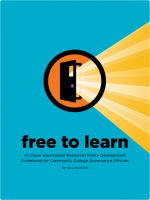Difference between revisions of "Free to Learn Guide"
| (47 intermediate revisions by 2 users not shown) | |||
| Line 1: | Line 1: | ||
| − | <div style="background-color:#f4f4f4;padding:15px;display:block;overflow-y:auto;clear:both;"> | + | <div style="background-color:#f4f4f4;padding:15px;display:block;overflow-y:auto;clear:both;font-size:1.15em;padding-bottom:0px;margin-bottom:15px;"> |
| − | <div style="float:left;margin-right: | + | <div style="float:left;margin-right:10px;text-align:center;"> |
| − | [[File:Freetolearn.png|left| | + | [[File:Freetolearn.png|left|150px|link=Media:FreetoLearnGuide.pdf]] |
| − | <h3 | + | <h3>Download</h3>[[Media:FreetoLearnGuide.pdf|PDF]]</div> |
| − | |||
| − | PDF | ||
| − | |||
| − | </div> | ||
| − | + | '''Free to Learn Guide'''<br /> | |
| + | by Hal Plotkin | ||
| − | + | '''Abstract:''' Open Educational Resources (OER) offer higher education governance leaders a cost-efficient method of improving the quality of teaching and learning while at the same time reducing costs imposed on students related to the purchase of expensive commercial textbooks and learning materials. Leading scholars around the world are already participating in the OER movement even without support from most higher education institutions, including community colleges. Higher education governance officials, particularly boards of trustees and senior academic governance leaders, have a tremendous opportunity to harness the advantages of OER for their institutions. | |
| − | '''Free to Learn''' was produced as a result of a grant from The William and Flora Hewlett Foundation. | + | <small>Except where otherwise noted, content of this document is licensed under a [http://creativecommons.org/licenses/by/3.0/ Creative Commons Attribution 3.0 License]. '''Free to Learn''' was produced as a result of a grant from The William and Flora Hewlett Foundation.</small> |
</div> | </div> | ||
| + | |||
| + | <small><center>'''Disclaimer:''' The text in the pages below may differ from the published version of the document above.</center></small> | ||
== Table of Contents== | == Table of Contents== | ||
| − | ===Acknowledgements=== | + | ===[[Free to Learn Guide/Acknowledgements|Acknowledgements]]=== |
| − | ===Introduction=== | + | ===[[Free to Learn Guide/Introduction|Introduction]]=== |
| − | ===A Short History of OER=== | + | ===[[Free to Learn Guide/A Short History of OER|A Short History of OER]]=== |
| − | ===Why So Little Attention from Higher Education Officials?=== | + | ===[[Free to Learn Guide/Why So Little Attention from Higher Education Officials?|Why So Little Attention from Higher Education Officials?]]=== |
| − | ===Improving the Quality of Teaching and Learning through Resource Sharing and Collaboration === | + | ===[[Free to Learn Guide/Improving the Quality of Teaching and Learning through Resource Sharing and Collaboration|Improving the Quality of Teaching and Learning through Resource Sharing and Collaboration]]=== |
| − | ===Ensuring Quality=== | + | ===[[Free to Learn Guide/Ensuring Quality|Ensuring Quality]]=== |
| − | ===Different Types of OER Meet Different Needs=== | + | ===[[Free to Learn Guide/Different Types of OER Meet Different Needs|Different Types of OER Meet Different Needs]]=== |
| − | ===Moving OER into the Educational Mainstream: Challenges and Opportunities=== | + | ===[[Free to Learn Guide/Moving OER into the Educational Mainstream: Challenges and Opportunities|Moving OER into the Educational Mainstream: Challenges and Opportunities]]=== |
| − | ===Passing a Pro-OER Board Level Policy | + | ===[[Free to Learn Guide/Passing a Pro-OER Board Level Policy: Initiating the Higher Education Governance Conversation|Passing a Pro-OER Board Level Policy: Initiating the Higher Education Governance Conversation]]=== |
| − | + | ===[[Free to Learn Guide/Conclusion|Conclusion]]=== | |
| − | ===Conclusion=== | + | ===[[Free to Learn Guide/Index of OER Resources|Index of OER Resources]]=== |
| − | ===Index of OER Resources=== | ||
__NOEDITSECTION__ | __NOEDITSECTION__ | ||
| + | __NOTOC__ | ||
Latest revision as of 21:56, 7 October 2010
Free to Learn Guide
by Hal Plotkin
Abstract: Open Educational Resources (OER) offer higher education governance leaders a cost-efficient method of improving the quality of teaching and learning while at the same time reducing costs imposed on students related to the purchase of expensive commercial textbooks and learning materials. Leading scholars around the world are already participating in the OER movement even without support from most higher education institutions, including community colleges. Higher education governance officials, particularly boards of trustees and senior academic governance leaders, have a tremendous opportunity to harness the advantages of OER for their institutions.
Except where otherwise noted, content of this document is licensed under a Creative Commons Attribution 3.0 License. Free to Learn was produced as a result of a grant from The William and Flora Hewlett Foundation.
